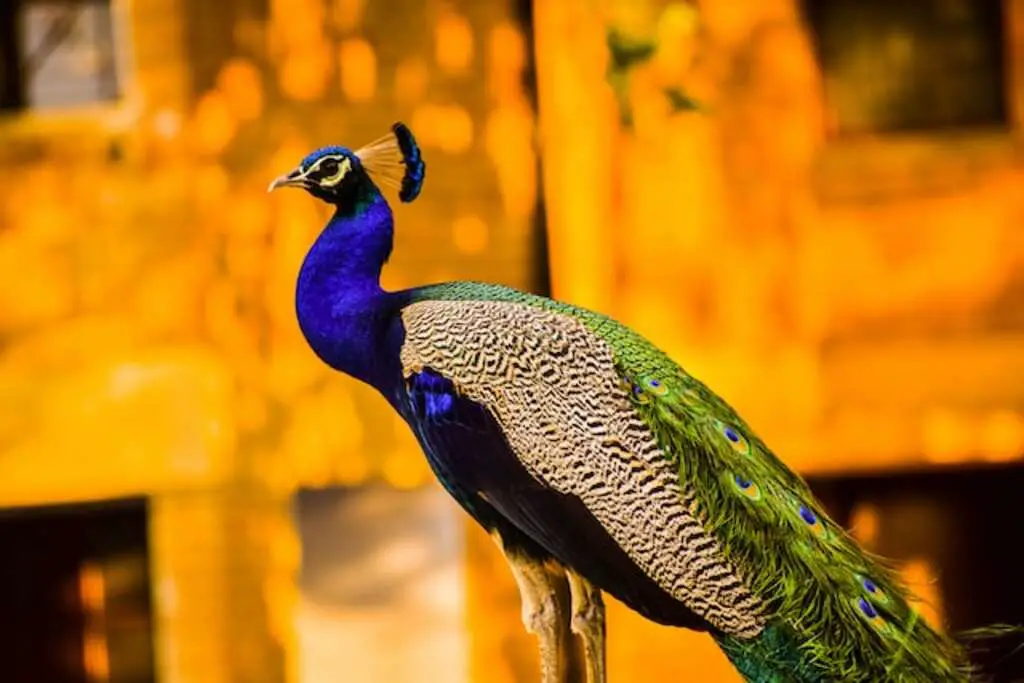Peacocks, the elegant birds known for their resplendent plumage, have a surprisingly varied palate. From leafy greens to insects and small creatures, they indulge in a range of foods both in the wild and in captivity. Join us as we uncover the secrets of what peacocks eat and how their diet contributes to their vibrant beauty and overall health.
Table of Contents
- 1 Peacock Diet in the Wild and as Pets
- 2 Peacock Digestive System
- 3 What Do Peacocks Eat?
- 4 What to Consider When Creating a Balanced Peacock Diet Plan
- 5 Peacock Diet in Different Seasons and Environments
- 6 Frequently Asked Questions
- 6.1 Can peacocks eat bread?
- 6.2 Do peacocks eat snakes?
- 6.3 Do peacocks eat rats?
- 6.4 Do peacocks eat meat?
- 6.5 What do baby peacocks eat?
- 6.6 What is a peacock’s favorite food?
- 6.7 What grains do peacocks eat?
- 6.8 What do peacocks drink?
- 6.9 How do peacocks eat snakes?
- 6.10 What are the foods that peacocks don’t eat?
- 7 Conclusion
- 8 Author
Peacock Diet in the Wild and as Pets
What do peacocks eat in the wild?
In the wild, peacocks are omnivores and have a varied diet. They eat a mix of plant foods, such as seeds, grains, berries, vegetables, and fruits, as well as insects, arthropods, small lizards, snakes, frogs, and rodents.
A diet rich in protein is necessary for maintaining the health of their feathers and they tend to have a robust appetite. Peacocks are opportunistic scavengers and will consume just about anything they find in front of their beaks.
They typically forage for food on the ground, and their food sources vary depending on the season and the availability of food in their habitat.
| Peacock Wild Diet | Nutritional Component | Examples |
|---|---|---|
| Protein | 30-40% | Insects, arthropods, small lizards, snakes, frogs, and rodents |
| Fruits and Berries | Vitamins and Minerals | Wild berries, fruits, and seeds |
| Vegetables and Grains | Energy and Minerals | Corn, wheat, millet, and oats |
What should you feed peacocks as pets?
If you have peacocks as pets, it’s important to provide them with a balanced diet that meets their nutritional requirements. A peacock’s diet should consist of 20 to 30% protein, which can come in the form of cooked eggs, dried cat food, or found insects.
The remaining portion should be a mix of berries, vegetables, seeds, and grass. It’s also a good idea to provide your peacocks with kitchen scraps, such as fruit and vegetable peels, as they can be a good source of nutrients.
Additionally, peacocks need access to fresh, clean water at all times.
| Peacock Pet Diet | Nutritional Component | Examples |
|---|---|---|
| Protein | 20-30% | Cooked eggs, dried cat food, found insects |
| Fruits and Vegetables | Vitamins and Minerals | Berries, vegetables, fruit and vegetable peels |
| Seeds and Grains | Energy and Minerals | Mixed seeds, cracked corn, wheat, millet, and oats |
Peacock varieties
The Peacock is a fascinating bird species that comes in different types, such as the Indian Blue Peacock, Green Peafowl, and Congo Peafowl. While their diets are similar, there may be slight variations in their food preferences and nutritional requirements.
Peafowl is a fascinating bird species that comes in different types, such as the Indian Blue Peacock, Green Peafowl, and Congo Peafowl.
Overall, whether in the wild or as pets, peacocks are omnivores and have a varied diet. By providing them with a balanced diet that meets their nutritional requirements, you can help keep your peacocks healthy and happy.
| Peacock Varieties | Scientific Name | Coloration | Size | Weight | Range | Habitat | Diet |
|---|---|---|---|---|---|---|---|
| Indian Blue | Pavo cristatus | Blue, green, gold | Up to 5 ft | 8-13 lb | India, Sri Lanka | Forests, fields, and gardens | Seeds, insects, small mammals, reptiles, fruits |
| Green | Pavo muticus | Green, blue, bronze | Up to 7 ft | 8-10 lb | Southeast Asia | Forests and woodlands near water | Seeds, insects, small mammals, reptiles, fruits |
| Congo | Afropavo congensis | Blue, green, purple | Up to 2.5 ft | 5-6 lb | Congo Basin | Forests, swamps, and riverine thickets | Insects, reptiles, amphibians, small mammals, nuts |
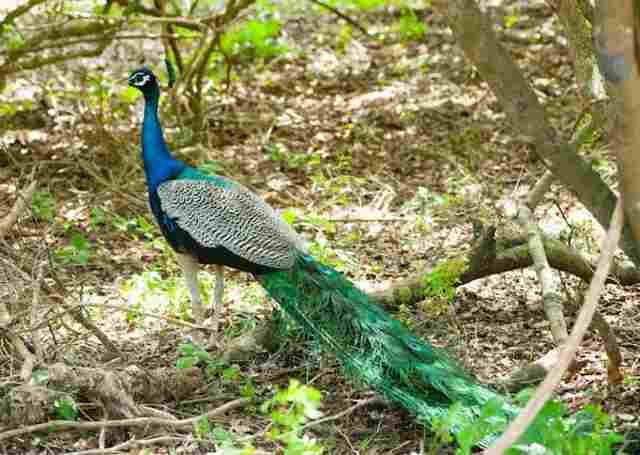
Peacock Digestive System
Anatomy of the Peacock’s Digestive System
The peacock’s digestive system is similar to that of other birds. It starts with the beak, which is used to pick up and break down food. The food then travels down the esophagus and into the crop, which is a sac-like organ that stores food and allows for slow digestion.
From there, the food moves into the proventriculus, which is the glandular stomach that secretes digestive enzymes. The food then moves into the gizzard, which is a muscular organ that grinds and crushes the food.
Finally, the food moves into the small intestine, where nutrients are absorbed, and then into the large intestine, where waste is eliminated.
| Part of Digestive System | Description |
|---|---|
| Beak | Used to pick up and break down food |
| Esophagus | Passage for food from beak to crop |
| Crop | Sac-like organ that stores food and allows for slow digestion |
| Proventriculus | Glandular stomach that secretes digestive enzymes |
| Gizzard | Muscular organ that grinds and crushes the food |
| Small Intestine | Site for nutrient absorption |
| Large Intestine | Site for waste elimination |
How peacocks digest food
Peacocks are omnivores and have a varied diet, including plant foods such as seeds, grains, berries, vegetables, and fruits, as well as insects, arthropods, small lizards, snakes, frogs, and rodents. They require a high-protein diet to keep their feathers healthy and generally have strong appetites.
Once the food is ingested, it is broken down in the crop and then moved into the proventriculus, where digestive enzymes are secreted.
The food is then ground up in the gizzard before moving into the small intestine, where nutrients are absorbed. The waste is then eliminated through the large intestine.
| Aspect of Digestion | Description |
|---|---|
| Diet | Omnivorous and includes plants and animals |
| Protein Requirement | High-protein diet required for healthy feathers |
| Appetite | Generally strong |
| Digestive Process | Ingestion, breakdown in crop, enzyme secretion in proventriculus, grinding in gizzard, nutrient absorption in small intestine, waste elimination in large intestine. |
Common digestive issues in peacocks
Peacocks can experience a variety of digestive issues, including impacted crops, sour crop, and gout. Impacted crops occur when the crop becomes too full and the food cannot pass into the proventriculus.
Sour crop occurs when the crop becomes infected with yeast or bacteria, leading to fermentation and a foul odor. Gout occurs when there is a buildup of uric acid in the joints, which can be caused by a diet that is too high in protein.
To prevent digestive issues in peacocks, it is important to provide a balanced diet and to monitor their food intake. To ensure your pet’s health, it’s crucial to seek veterinary attention without delay if you observe any indications of digestive discomfort, such as vomiting or diarrhea.
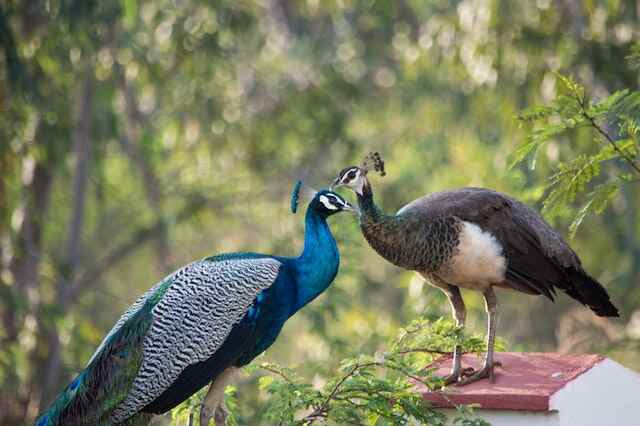
What Do Peacocks Eat?
Peacocks are easy-going omnivores and have a varied diet that includes seeds, grains, berries, vegetables, and fruits. They also consume insects, arthropods, small lizards, snakes, frogs, and rodents. Their feather health is maintained by a high-protein diet, and they typically have robust appetites.
Recommended foods for a balanced peacock diet
It is important to provide peacocks with a balanced diet to maintain their health and beautiful feathers. A balanced diet for peacocks should contain:
- High-quality game bird feed
- Fruits such as berries and grapes
- Examples of vegetables include leafy greens, carrots, and sweet potatoes.
- Insects such as mealworms and crickets
- Small amounts of grains such as corn and wheat
| Peacock Diet Recommendations | Nutritional Component | Examples of Foods |
|---|---|---|
| High-quality game bird feed | Protein, Energy, and Minerals | Purina Game Bird Feed, Mazuri Game Bird Feed |
| Fruits | Vitamins and Antioxidants | Berries, Grapes |
| Vegetables | Vitamins and Minerals | Leafy Greens, Carrots, Sweet Potatoes |
| Insects | Protein and Minerals | Mealworms, Crickets |
| Grains | Energy and Fiber | Corn, Wheat |
Foods to avoid giving peacocks
While peacocks are omnivores and will eat a variety of foods, there are some foods that should be avoided:
- Processed foods such as chips and crackers
- Foods high in salt or sugar
- Avocado and chocolate, which can be toxic to birds
- Raw beans and rhubarb, which contain toxins that can be harmful to birds
| Foods to Avoid | Why to Avoid |
|---|---|
| Processed foods such as chips and crackers | Lacks essential nutrients |
| Foods high in salt or sugar | Can lead to obesity and health problems |
| Avocado and chocolate | Toxic to birds |
| Raw beans and rhubarb | Contain toxins harmful to birds |
How much and how often to feed peacocks
Peacocks should be fed twice a day, with the amount of food depending on their age and size. Adult peafowl should be fed about 1/4 to 1/2 pound of feed per day, while chicks should be fed about 1/8 to 1/4 pound of feed per day.
It is important to monitor the amount of food given to peacocks to prevent overfeeding, which can lead to obesity and health problems. Additionally, peacocks should always have access to fresh, clean water.
By providing a balanced diet and monitoring their food intake, you can ensure that your peacocks stay healthy and maintain their beautiful feathers.
| Feeding Recommendations | Age/Size | Amount |
|---|---|---|
| Adult peafowl | 1/4 to 1/2 pound of feed per day | |
| Chicks | 1/8 to 1/4 pound of feed per day |
It is important to feed peacocks twice a day, provide access to fresh water, and monitor their food intake to avoid overfeeding and maintain their health.
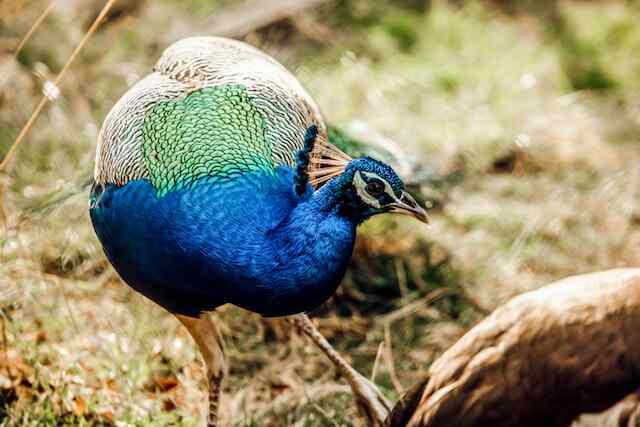
What to Consider When Creating a Balanced Peacock Diet Plan
Nutritional Needs of Peacocks
To ensure that your peacock is healthy and happy, you need to provide a balanced diet that meets its nutritional requirements. Peacocks require a diet that is high in protein, vitamins, and minerals.
According to Birdfact, peacocks need a diet that consists of 20-30% protein, which can be found in cooked eggs, dried cat food, and insects. Vegetables, berries, seeds, and grass should make up the remainder of their diet.
Age and Health Considerations
When creating a diet plan for your peacock, it is important to take into account its age and health. Young peacocks require more protein than adult peacocks, and older peacocks may have difficulty digesting certain foods.
If your peacock has any health issues, such as kidney disease or obesity, you may need to adjust its diet accordingly. Consult with a veterinarian if you have any concerns about your peacock’s health.
Availability of Food
When planning your peacock’s diet, consider what foods are readily available to you. Peacocks can eat a variety of foods, including legumes, vegetables, fruit, and meat.
If you have access to a garden, you can grow vegetables and fruits that your peacock can eat. You can also purchase commercial peacock feed, which is specially formulated to meet their nutritional needs.
Feeding Strategies for Optimum Health
To ensure that your peacock is getting the nutrients it needs, you should feed it a variety of foods. You can offer your peacock a mix of vegetables, fruits, seeds, and insects. To ensure optimal health, it is crucial to consistently offer access to uncontaminated and newly sourced water.
You can also supplement your peacock’s diet with vitamins and minerals to ensure that it is getting all the nutrients it needs.
Overall, creating a balanced peacock diet plan requires careful consideration of your peacock’s nutritional needs, age and health, availability of food, and feeding strategies. By providing your peacock with a healthy diet, you can ensure that it lives a long and happy life.
| Nutritional Needs of Peacocks | Age and Health Considerations | Availability of Food | Feeding Strategies for Optimum Health |
|---|---|---|---|
| High in protein, vitamins, and minerals | Young peacocks require more protein than adults, older peacocks may have difficulty digesting certain foods, consult with a veterinarian for health concerns | Peacocks can eat a variety of foods including legumes, vegetables, fruit, and meat, commercial peacock feed is available | Feed a variety of foods, offer fresh water at all times, supplement with vitamins and minerals as needed |
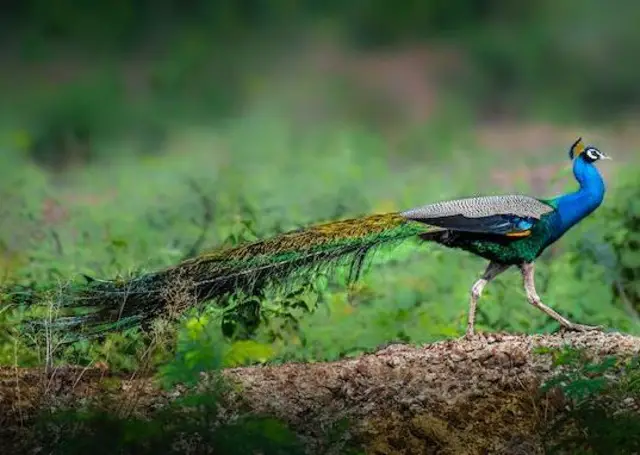
Peacock Diet in Different Seasons and Environments
What do peacocks eat in the winter?
During the winter, peacocks have to adjust their diet to the scarcity of food. They tend to eat more seeds, berries, and grains, as these are the easiest to find during the colder months. However, they still need to maintain a high-protein diet to keep their feathers healthy.
Peacocks can find protein in insects, small lizards, and rodents. They also need access to fresh water, as it can be more difficult to find during the winter.
What do peacocks eat during mating season?
During mating season, peacocks require a diet that is high in protein and other nutrients to support their reproductive activities. They tend to eat more insects, such as crickets and grasshoppers, as these are high in protein.
Peacocks also eat more fruits and vegetables during this time to get the necessary vitamins and minerals. This is important for both the male and female peacocks, as they need to be in optimal health to successfully mate.
Adjusting the diet for captive peacocks
Captive peacocks require a different diet than those in the wild, as their environment is more controlled. They can be fed a combination of commercial feed and fresh food, such as fruits and vegetables. It is important to provide them with a high-protein diet, as this is essential for maintaining their feathers.
Cooked eggs and dried cat food are good sources of protein for captive peacocks. A crucial aspect is to ensure access to clean and uncontaminated water continuously. Overall, peacocks are omnivores and can eat a variety of foods.
Their diet preferences can vary depending on their environment and the season. It is important to provide them with a balanced diet that includes a mix of protein, fruits, vegetables, and grains.
By adjusting their diet to their environment and needs, you can help ensure that your peacocks are healthy and thriving.
| Season/Environment | Food Preferences | Protein Sources | Other Nutrient Sources |
|---|---|---|---|
| Winter | Seeds, Berries, Grains | Insects, Small Lizards, Rodents | Fresh Water |
| Mating Season | Insects, Fruits, Vegetables | Crickets, Grasshoppers | Vitamins and Minerals |
| Captivity | Commercial Feed, Fruits, Vegetables | Cooked Eggs, Dried Cat Food | Fresh, Clean Water, Protein |
| Wild | Varied | Insects, Rodents, Reptiles, Seeds, Fruits, Vegetables | Water, Vitamins and Minerals |
Note: In the ‘Wild’ column, peacocks’ food preferences vary based on their natural habitat and region. This table aims to provide a general idea of their diet.
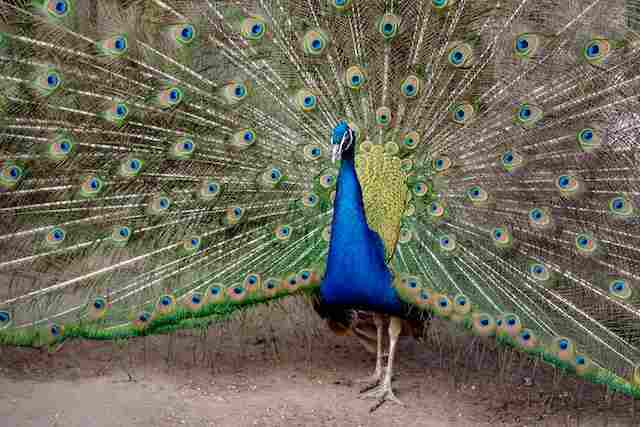
Frequently Asked Questions
Can peacocks eat bread?
Yes, peacocks can eat bread, but it should not be a significant part of their diet. Bread is not very nutritious and can cause digestive issues if fed in large quantities.
Do peacocks eat snakes?
Yes, peacocks do eat snakes. They are omnivores and will eat a variety of living creatures, including insects, small lizards, frogs, and rodents.
Do peacocks eat rats?
Yes, peacocks will eat rats if given the opportunity. They are known to eat small rodents and other small animals.
Do peacocks eat meat?
Yes, peacocks are omnivores and will eat meat. They will eat insects, small reptiles, amphibians, and small mammals.
What do baby peacocks eat?
Baby peacocks, also known as peachicks, eat a diet similar to adult peacocks but in smaller quantities. In order to promote their growth and development, they need to consume a diet that is rich in protein. Their diet should consist of insects, small worms, and finely chopped vegetables.
What is a peacock’s favorite food?
Peacocks do not have a specific favorite food. They are omnivores and will eat a variety of foods, including seeds, grains, berries, vegetables, fruits, insects, arthropods, small lizards, snakes, frogs, and rodents.
What grains do peacocks eat?
Peacocks will eat a variety of grains, including corn and wheat. These grains provide a source of carbohydrates and are a good addition to their diet.
What do peacocks drink?
Peacocks drink water and require a constant supply of fresh, clean water to stay healthy.
How do peacocks eat snakes?
Peacocks will catch and kill snakes with their beaks and then swallow them whole. They have a strong digestive system that can break down even tough prey like snakes.
What are the foods that peacocks don’t eat?
Peacocks are omnivores and will eat most foods. However, they should not be fed foods that are toxic to them, such as avocado, chocolate, and caffeine. They should also not be fed foods that are high in salt or sugar, as these can cause health problems.
Conclusion
Now that you know what peacocks eat, you can create a meal plan that provides them with the necessary nutrients for optimum health. A balanced peacock diet should include a variety of food sources, including seeds, grains, berries, vegetables, fruits, insects, arthropods, small lizards, snakes, frogs, and rodents.
Peacocks have strong appetites and require a high-protein diet to keep their feathers healthy. You can supplement their diet with game bird mixes and crushed oyster shells, which are packed with the calcium that peacocks need to ensure healthy feathers.
When feeding peacocks, it’s important to consider their food preferences and feeding habits. They are non-fussy omnivores and will eat most plant foods, but they also enjoy feeding on live prey. To ensure their safety, it is advisable to separate fowls with aggressive tendencies from other birds while in captivity.
Overall, providing a well-rounded diet that meets their nutritional requirements is key to keeping your peacocks healthy and happy. With the information provided in this article, you can create a meal plan that will give your peacocks the best chance for a long and healthy life.

